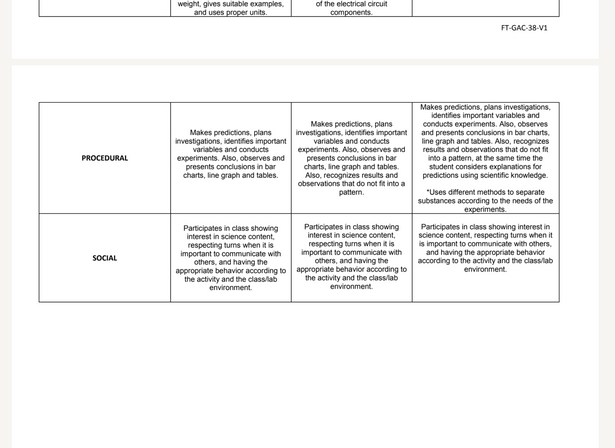Adobe InDesign Microlearning Tutorials – GLU (Grafisch Lyceum Utrecht)
Problem Statement: In 2016, the Natural Sciences curriculum at Liceo de Colombia faced several challenges: - Students were disengaged and underperforming in science. - Traditional teaching methods were not fostering deep understanding or critical thinking. - Assessment practices were causing anxiety and limiting authentic demonstration of learning. - Teachers lacked autonomy and support, and instructional time was frequently interrupted by extracurricular activities. These issues prompted a need for a comprehensive redesign of the science curriculum to improve student engagement, performance, and conceptual understanding. Project Scope and Collaboration: As the lead designer for 6th and 7th grade Natural Sciences, I collaborated with a team of science teachers to redesign the entire science curriculum for Liceo de Colombia. The goal was to create a more student-centered, inquiry-based learning experience aligned with modern pedagogical principles. Instructional Design Approach: Learning Theory Applied: This project was grounded in Constructivist Learning Theory, which emphasizes: - Active student engagement - Learning through experience and social interaction - Knowledge construction rather than passive reception Additionally, Sociocultural Theory (Vygotsky) informed the use of activity centers, student tutors, and instructional conversations, promoting learning through collaboration and scaffolding. Curriculum Structure and Design: The redesigned curriculum was organized into three thematic terms for 6th grade: Term I: - Topics: Human Body, Acids and Bases, Forces, Motion and Energy - Throughline: How do we interact with visible and non-visible things? - Project/Product: The Training Plan – Students designed sport-specific training plans integrating biology and physics concepts. Term II: - Topics: Microorganisms and Habitats, Particle Theory, Electrical Circuits - Throughline: Every need has a solution? - Project/Product: Organic Cheese – Students created cheese using fermentation, applying chemistry and biology. Term III: - Topics: Species and Classification, Rocks and Soils, Earth and Its History, Universe - Throughline: My planet, my home, my responsibility… - Project/Product: Sci-Fi Comic Book – Students illustrated scientific concepts through storytelling. Each term included cognitive, procedural, and social performance goals, ensuring holistic development. Instructional Strategies: To address engagement and performance issues, I implemented: - Activity Centers: Students rotated through five centers: - Joint Productivity - Language and Literacy Development - Contextualization - Challenging Activity - Instructional Conversation - Graphic Organizers: Tools like KWHL charts, mind maps, and analogy diagrams supported conceptual understanding. - Collaborative Learning: Students worked in pairs and groups, often with peer tutors. - Contract Grading: Students focused on demonstrating knowledge rather than fearing failure, reducing test anxiety and improving performance. Assessment and Monitoring: - Formative Assessment: Immediate feedback on center activities. - Performance-Based Assessment: Projects and experiments replaced traditional tests. - Quantitative Results: All planned content was fully developed and implemented (100% completion in both Term I and II). - Reinforcement: Student tutors and differentiated activities supported struggling learners. Outcomes: - Improved Engagement: Students were more active and interested in science. - Higher Performance: Contract grading and project-based learning led to better understanding and reduced anxiety. - Teacher Empowerment: The redesign fostered professional autonomy and collaboration. - Curriculum Innovation: The project served as a model for future interdisciplinary and iv. inquiry-based curriculum development. Reflections and Recommendations: -Support Needed: More institutional backing and resources (e.g., science books) would enhance impact. - Structural Changes: A classroom model where teachers have dedicated spaces could improve logistics and learning. - Grading Reform: Continued advocacy for alternative assessment models is essential. Here you can see the result of our analysis, the annual subject plan, parts of trimester 1 and 2 for 6th grade, rubrics, assessments, Guides etc etc developed in this project.





























